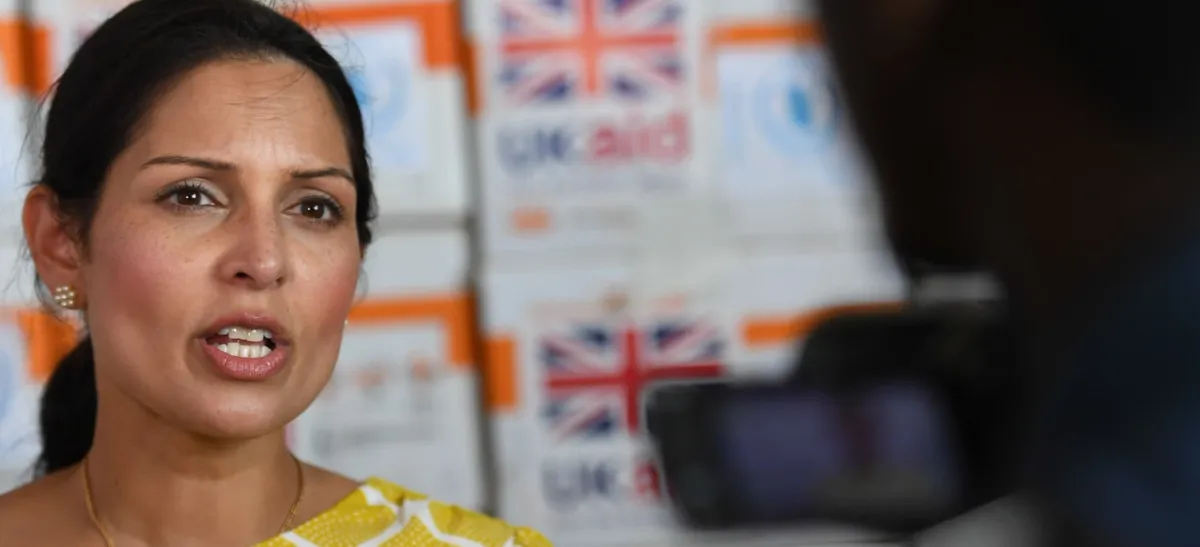Dear Priti: You Can’t Always Wait for a ‘Safe and Legal’ Route When Your Country Is Thrown Into Chaos
No, meeting Afghan migrants at the airport isn’t a warm welcome when you're also trying to push through a bill designed to make their lives considerably worse.

Access the Audio Read version of this article directly on Spotify for Podcasters.
As the world watched the Taliban take back control of Afghanistan, after being defeated by Western forces twenty years ago, we’ve also witnessed the last of the Western efforts, including the UK, in evacuating Afghans from their country - ahead of the then-31st August deadline for the Western allied forces to leave the country. The Taliban rule could mean instability and violence for so many Afghans, especially those who have worked alongside Western forces all these years. Within days, several nations set up or bolstered their resettlement schemes in order to evacuate and house Afghans wishing to leave Afghanistan. And one of them is the UK.
The government recently launched the Afghan Citizens' Resettlement Scheme (ACRS), which will allow a total of 20,000 Afghans to settle in the UK in the long-term, prioritising women, children, and those from minority backgrounds. The scheme would let 5,000 Afghans settle in the UK in the short-term, which many have described as wholly inadequate and if anything, quite insulting. The UK has received quite a lot of criticism for its low resettlement numbers, especially when compared to other nations such as Germany and Pakistan, but Home Secretary Priti Patel defends her decision. Patel argues that the UK cannot handle or accommodate 20,000 Afghan refugees ‘all in one go’. But as one of the richest nations in the world, how true is this claim?
In her book Border Nation, published in 2020, writer Leah Cowan wrote about some of the common questions and rebuttals people get when talking about immigration and the abolition of borders. She explains that the idea that migrants coming to the UK will put a strain on public services and housing is simply not true. The strain that public services, like the NHS, are currently feeling is not due to immigration but due to the privatisation and chronic and sustained underfunding by decades of Tory austerity. And when it comes to housing, this is again due to how our housing system is built and operated by private companies, rather than the actual availability of homes. In fact, in November 2020, 268,385 homes in England had been empty for at least six months (Source: Big Issue). These are homes that could be used to house some of the most vulnerable in our society but are instead just sat there unoccupied. The UK does have the means to resettle many more Afghans but is simply choosing not to, as it does not fit with the priorities of the Hostile Environment - the set of policies making life even more difficult for migrants living in the UK, introduced by Theresa May in 2012.
And this ‘protecting our borders’ rhetoric is at complete odds with the notion of ‘warmly welcoming’ Afghans to the UK, with the government operation ironically named Operation Warm Welcome. Priti Patel meeting Afghans at the airport and talking to them isn’t a warm welcome when she’s also trying to push through her new Nationality and Borders Bill, which would make the lives of migrants considerably worse. It’s a Bill that would effectively criminalise even more routes into the UK, whilst limiting the number of official ‘safe and legal’ routes.
And this is something we’re already seeing play out with the Afghan Resettlement Minister, Victoria Atkins, telling Sky News earlier this month that Afghan refugees coming across the English Channel in boats won’t be resettled. Just a week ago, it was announced that the Home Office had authorised Border Force officials to turn back migrant boats in the English Channel, a breach of maritime law, ‘whenever it is practical and safe to do so.’’ (Source: BBC). But when your country has been thrown into violence and turmoil, it isn’t always possible to wait for these ‘safe and legal’ routes to become available to you. You do anything you can to escape, which may include pursuing another route to the UK. On top of this, even when an official route exists, this route may still be unsafe or inaccessible, as we recently saw with the ISIS-K attacks on the airport in Kabul.
All of this is just indicative of the government and the Home Office still pursuing a Hostile Environment, even when faced with people escaping a conflict that is directly caused by their involvement for the last two decades. This is not the time for the government to turn their backs on the very people they swore to stand by and help when they invaded Afghanistan in 2001. We should be helping as many Afghans as we possibly can, no matter their eligibility or how they got to the UK. Everyone deserves to live in safety and without fear.





